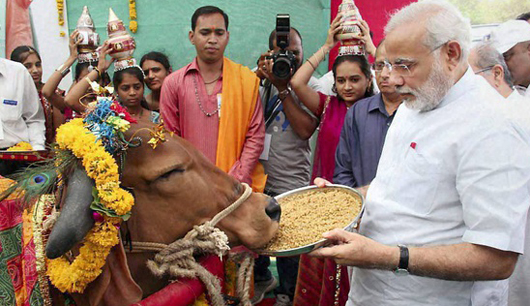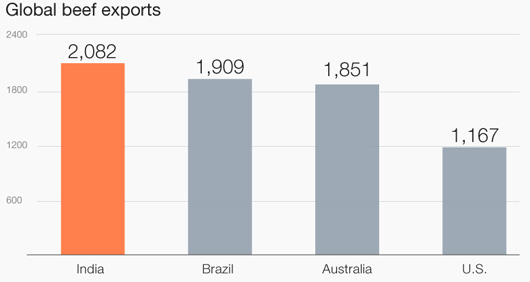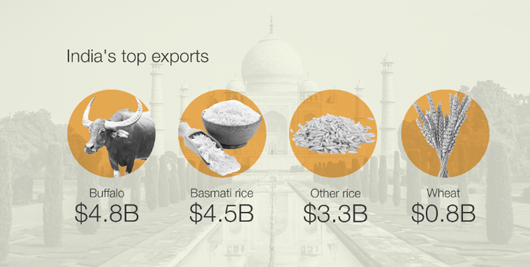New Delhi, Aug 10: During the rule of Bharatiya Janata Party India has not only retained its global championship in butchering cattle and exporting beef, but also has managed to provide buffalo meat at cheaper rates to the mankind!

According to the latest data released by the U.S. Department of Agriculture India retains its top spot as the world’s largest exporter of beef and has extended its lead over the next highest exporter, Brazil.
According to the data, India exported 2.4 million tonnes of beef and veal in FY2015, compared to 2 million tonnes by Brazil and 1.5 million by Australia.
These three countries account for 58.7 per cent of all the beef exports in the world. India itself accounts for 23.5 per cent of global beef exports. This is up from a 20.8 per cent share last year.
India's buffalo and cow meat mostly ends up on plates in Asia and the Middle East, where rising wealth is spurring demand among diners for animal protein.
But India's role in the global meat trade sticks out in the largely Hindu country where vegetarianism is widespread.
The cow is revered in Hindu culture, the religion observed by the majority of India's 1.3 billion people, and restrictions on cattle slaughter apply in many states.
Still, the $4.8 billion annual export trade has almost developed by “accident” -- the animals are needed to keep India's huge domestic dairy industry going, said Rabobank analyst Pawan Kumar.

This is unique among countries with large bovine exports, Kumar said. It also means buffalo meat from India is cheaper. That helped the country generate record export earnings from the beef last year, although growth is moderating from the 30% annual rate seen between 2010 to 2013.
Here's where it all goes: Vietnam is the top importer, with Malaysia, Egypt and Saudi Arabia other key markets.
Then there's China, which may actually be the largest consumer of the meat, according to Rabobank's Kumar. Some 40% of Indian buffalo is sent to Vietnam, before large quantities make their way across the Chinese border. That trade doesn't show up in official statistics.
Data from market research firm Euromonitor International shows sales of beef, lamb and chicken in India have all increased steadily over the past six years.
Rising wealth is a big reason for the growth. Analyst Anastasia Alieva said India's disposable income has surged 95% since 2009, and meat consumption has nearly doubled over that time.
Also Read:
Worship, Kill, Export: BJP ruled India is world’s largest beef exporter!
Impact of Modi’s China visit: Chinese inspectors to allow Indian beef exports!






Comments
There should be all around awareness programme to make people understand the significance of Indian desi cow. Indian desi cow (not jersey cow or any other breed) has the superior and spiritual (not religious) value including her product like Milk, Urine & Gobar. There is direct link between her and mother earth. The peace and prosperity can be achieved on the earth by serving the desi cows. Therefore, service to Indian desi cow should not be linked to any religion.
Her urine is used to cure dreaded disease like Cancer, AIDS and many other type of disease and her gobar can be used as an alternative source of energy through gobar plant for generating gas for cooking, gas for generating electricity and gas for running the vehicles etc. Gobar and urine also used as best available fertilizer & insecticides. Unfortunately chemical fertilizer and poisonous insecticides are used which is not only producing harmful crops but polluting ground water used for drinking purpose. Indian desi cows are the backbone of organic agriculture, instrumental for environment protection, healthcare and peace & prosperity on earth. In short she is the backbone of human welfare.
We must work hard and target to bring law on complete ban on desi cow slaughter including calf & bulls in the country through awareness programme, legal and political course in order to achieve peace & prosperity on the Earth.
Er. Rajeev Agrawal
[email protected]
There should be all around awareness programme to make people understand the significance of Indian desi cow. Indian desi cow (not jersey cow or any other breed) has the superior and spiritual (not religious) value including her product like Milk, Urine & Gobar. There is direct link between her and mother earth. The peace and prosperity can be achieved on the earth by serving the desi cows. Therefore, service to Indian desi cow should not be linked to any religion.
Her urine is used to cure dreaded disease like Cancer, AIDS and many other type of disease and her gobar can be used as an alternative source of energy through gobar plant for generating gas for cooking, gas for generating electricity and gas for running the vehicles etc. Gobar and urine also used as best available fertilizer & insecticides. Unfortunately chemical fertilizer and poisonous insecticides are used which is not only producing harmful crops but polluting ground water used for drinking purpose. Indian desi cows are the backbone of organic agriculture, instrumental for environment protection, healthcare and peace & prosperity on earth. In short she is the backbone of human welfare.
We must work hard and target to bring law on complete ban on desi cow slaughter including calf & bulls in the country through awareness programme, legal and political course in order to achieve peace & prosperity on the Earth.
Add new comment